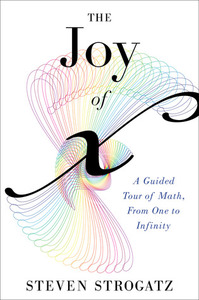You need to sign in or sign up before continuing.
Take a photo of a barcode or cover
funny
informative
inspiring
medium-paced
An excellent book explaining the different facets of the entire field of math. Because most of the chapters are written for an online column at The New York Times, most chapters are self-contained short stories - with a character introduction (a mathematical concept), a conflict (a mathematical conundrum), a resolution (how mathematicians in our past solved it), and an epilogue (updating how our main character is doing in the modern era, and may or may not contain a punchline or two).
There are of course chapters which are sequels or prequels to other chapters, but you may otherwise open the book to any chapter that you find interesting.
With each chapter self-contained, the book is organized into five themes covering a certain branch of mathematics - numbers, relationships, shapes, change and data. The final section retreads the five themes, looking at a specific frontier.
There are of course chapters which are sequels or prequels to other chapters, but you may otherwise open the book to any chapter that you find interesting.
With each chapter self-contained, the book is organized into five themes covering a certain branch of mathematics - numbers, relationships, shapes, change and data. The final section retreads the five themes, looking at a specific frontier.
The author creates SUCH a beautiful walkthrough of some of the most interesting mathematical concepts using simple examples and drawings anyone could understand (and why they would even want to understand). What a great read, and amazing answers to "when will we ever use this in life?" for the math teachers and skeptical students out there.
challenging
informative
inspiring
reflective
medium-paced
What a fantastic book. The short digestible chapters and the wonderful down to earth personality of the author makes this book an easy read. The simple explanations with understandable examples and images really helps explain the topics of algebra, trigonometry, geometry, and calculus in ways that I've never understood them before. The author sums up the theme of the book on page 131 "Every year about a million American students take calculus. But far fewer really understand what the subject is about or could tell you why they were learning it... There are so many new ideas to absorb that the overall framework is easy to miss." That is what the author does brilliantly; explains the overall framework of these topics and proves them, not with elaborate, difficult to follow mathematical proofs, but with images and intuitive examples. A truly excellent and unique book. I wish I had read this book 10 years ago.
challenging
informative
inspiring
medium-paced
The books is light to read. It does not go into the details but what it does is introduce mathematical concepts using trivial examples and easy to understand explanation. The language is simple and it serves readers of all ages. Must read if you never liked maths. :)
A fun, simple introduction to mathematics - thoroughly enjoyable!
A brief book about what you learned and why you did. It does a good job on explaining different topics and making them entertaining.
This book perfectly illustrates what I love about math. It also makes me want to rank A Mathematician’s Lament worse, since this is basically the same thing sans rampant complaining, and with a fascinating concept every chapter. Lament gave me some ideas, but Joy of X actually illustrated how amazing they could really be.



